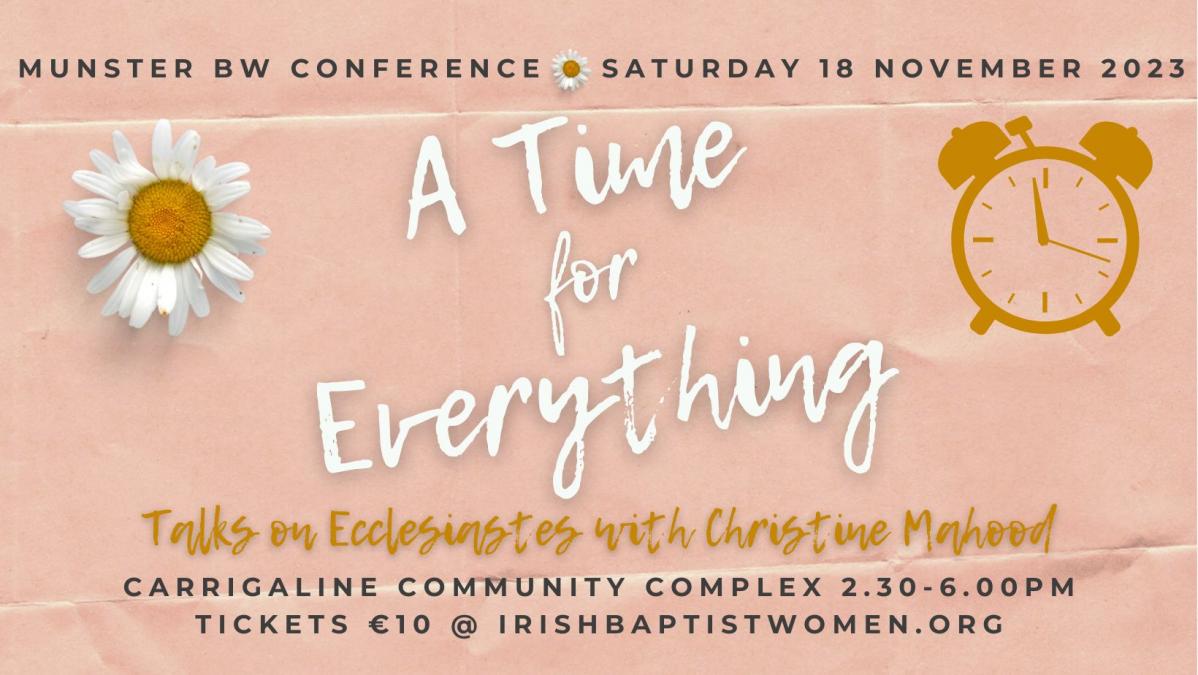Now that we’ve begun a new year and look forward to the coming spring and all the year will bring, we can’t help but be reminded of the changing seasons. We may also find ourselves pondering the past - how we’ve grown, the highs and lows, the missed opportunities, the changes we hope to make - and the inevitable passing of time as we acknowledge how the years fly by.
In light of the ever-changing seasons and the unstoppable march of time, if we stop and ponder for just a moment, there is a definite sense that we are very small in the grand scheme of life and existence. Many people today and throughout time have stopped to ask, “What is it all for?” and “Can I find joy in the fleeting pleasure in life, or is it all for nothing?”
The “teacher” in Ecclesiastes was no different. Over 2,000 years ago, this teacher and King of Jerusalem pondered big questions on his search to make sense of life “under the sun”. The great efforts he took and the conclusions he found are included in God’s inspired word for a reason, and they are well worth looking into as we face the same desire for understanding the world God has placed us in.
That is just what a group of women gathered to do on Saturday, 18 November at the Baptist Women’s Conference. More than 100 women came together in Carrigaline, Cork for fellowship, teaching, mutual encouragement, praise and worship, and of course, no gathering would be complete without teas and coffees and a delicious array of treats and sweets.
Our speaker, Christine Mahood, with insightful teaching and evident passion and understanding of Ecclesiastes, led us through the findings of the “teacher”. It is no small feat to make sense of all that’s in Ecclesiastes in just two teaching sessions, but Christine highlighted the main themes and clarified what many find to be a confusing book of the Bible.
At the start, Christine warned us not to be frightened by the bleak picture of life painted by the teacher as he described everything as fleeting and elusive, much like smoke that is here and gone in a just a few moments. The teacher knew truths about God, but found it hard to reconcile those truths with what he saw happening in the world. He began by highlighting difficult realities, such as the fleeting nature and brevity of life, the fact that there is nothing truly new under the sun, the wearisome cycles of life and nature, how nothing ever feels like enough, and that we all will one day die.
Pressing on through these grim truths, Christine explained the teacher’s endeavours to find satisfaction and meaning in life. He sought to attain much wisdom and knowledge and spared no expense in seeking pleasure in great projects and extravagant riches and possessions, and even though he denied himself nothing his heart desired, he came away concluding that it was all fleeting, “a chasing after the wind” (2:11). His sorrow increased with wisdom, and education, while valuable, could not answer the big questions in life. Nothing was to be gained from all his endeavours, and death would still inevitably come.
A bit depressing, right? If you are inclined to agree, then the teacher has been successful. A strange goal, you might think, but Christine explained that the teacher wants the reader to feel the horror, hopelessness and meaningless of life without God. He wants us to understand that all our efforts make no difference regarding our death, and all earthly things will be left behind. But that is not the end. We know from the whole counsel of Scripture that it is not wrong to enjoy temporal pleasures, but what matters is “the place they hold in our hearts”. The teacher wants to strip away everything we are tempted to chase after in the place of Christ in our hearts. Temporary pleasures and endeavours are of little value in light of eternity, and we must guard against putting too much hope, joy and trust in them.
After a dismal start and clear warning against idolatry, Christine highlighted what we were waiting for - what she called “chinks of light”. The teacher did not remain in a state of hopelessness, but concluded that satisfaction is possible as a gift from God. Several times throughout the book, he said “Eat, drink and find enjoyment” (2:24), implying that the ability to enjoy comes from knowing God. Believers still shouldn’t expect to feel that we’ve mastered life on earth because that is clearly not God’s plan for us. We must guard against expecting too much from the good gifts God gives; however, we can give Him thanks and enjoy them to His glory.
The teacher went on with a beautiful and well-known poem in chapter 3 comprising the “complete totality of human experience”, followed by the encouraging truth that “He [God] has made everything beautiful in its time.” (3:11). The Lord orders everything that happens, and while many things in life are anything but beautiful (war, hatred, loss), it’s all beautiful because He makes it so. Christine encouraged us to have the courage to trust that God is in control and to accept His wisdom and good purposes in all things - to believe that not a single detail is wasted.
And finally, the teacher’s conclusion: “Fear God and keep his commandments, for this is the whole duty of man. For God will bring every deed into judgment, with every secret thing, whether good or evil.” (12:13-14). Nothing else in life satisfies, except to know God and live for Him. With that, Christine pointed us to Jesus! Outside of Christ, it is a terrifying thing to face God’s judgment, but in Him, we have forgiveness, life, acceptance and hope beyond this life. We were dead but made alive in Christ (Col 2:13-15) so that every moment of our lives would have purpose and significance as we trust and rely on Him through the transforming power of the gospel and the Holy Spirit. What an encouraging way to press on in 2024! May we fear God, hope in Him above all else and enjoy His good gifts as we live each day and each season for His glory.





